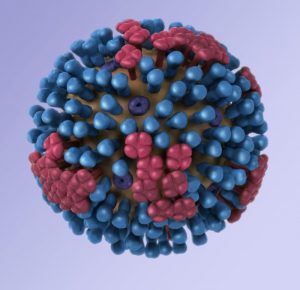A new study points to the ability of specific alleles of the gene IL-28B to increase or decrease the effectiveness of the seasonal flu vaccine, independent of the flu strain the vaccine is targeted against.

The seasonal flu vaccine is developed against a number of influenza strains each year, based on historical patterns. With luck and skill, the vaccine is 66-90% effective at preventing infection, and 30-85% effective in preventing hospitalization if an individual contracts the flu. The range in effectiveness is due to the health of an individual’s immune system, which can be altered due to age or immunosuppressive therapy.
While most individuals with compromised immune systems do not develop immunity towards seasonal influenza despite vaccination, some still do. Researchers from Switzerland, Canada, and the US decided to determine why, even with a compromised immune system, individuals are still able to mount an immune response.
Previous research had focused on IL-28B as a necessary gene for an individual to mount an immune response to influenza. The researchers discovered this gene makes two alleles: a major T and a minor G allele. Most healthy people carry at least one copy of the minor G allele, but the study showed that almost 70% of individuals with compromised immune systems had two major T alleles, and 96% had at least one major T allele.
Through voluntary testing, the researchers determined that individuals with compromised immune systems are less likely to mount an immune response if they have one or more copies of the major T allele. In a cohort of healthy volunteers collected for this study, those with one or more major T alleles also mounted less of an immune response than those with two minor G alleles, although all immune responses were greater than those with compromised immune systems. The researchers concluded the minor G allele produces a protein product that increases the effectiveness of the adjuvants in the seasonal vaccine, increasing the degree of immune response.
This points to the possibility of tailoring the seasonal influenza vaccine to upregulate the IL-28B gene even in individuals with one or more major T alleles. The gene targeting would provide no advantage to otherwise healthy individuals with two minor G alleles, but could help protect the 96% of individuals with compromised immune systems, as well as those in the general public who are healthy but harbor one or more major T alleles. IL-28B has also been implicated in preventing infection by other viruses, showing that this study could pave the way for a spate of new antiviral vaccines.

